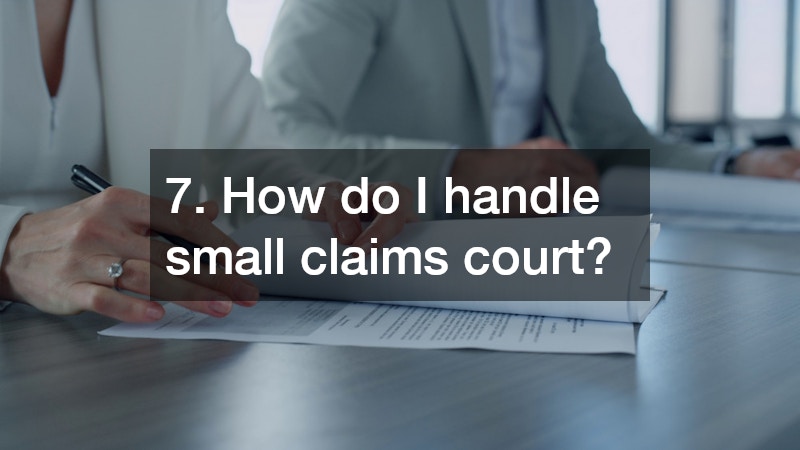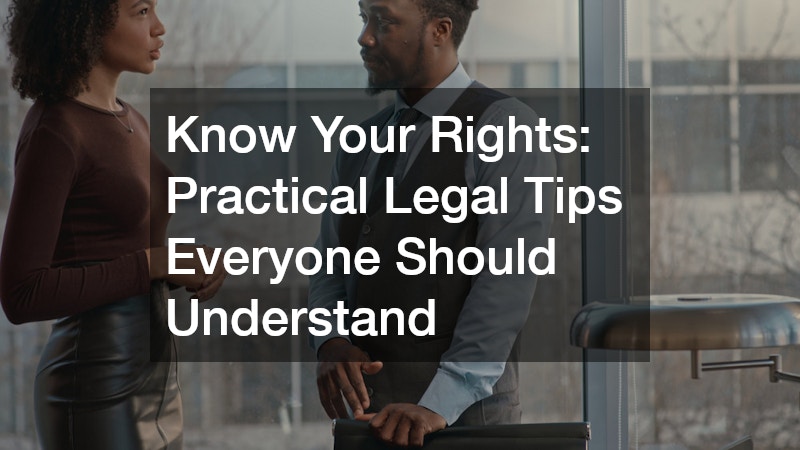In today’s world, being aware of your legal rights is of paramount importance. Whether it’s understanding what to do when stopped by the police, safeguarding your personal data online, or knowing how to navigate family and custody issues, having practical legal tips at your disposal empowers you to handle life’s challenges with confidence. We will explore a range of topics that every individual should be familiar with to enhance their awareness and understanding of legal matters.
1. What are my rights when stopped by the police?

One of the most critical instances that underscore the need for legal tips is when you are stopped by the police. It’s essential to remain calm and composed, as your behavior during such encounters can determine the outcome. Knowing your rights, such as the right to remain silent and the right to refuse a search, can safeguard your interests.
While dealing with law enforcement, it’s crucial to ask if you’re free to leave. This simple question can clarify whether you are being detained or if the encounter is voluntary. Peacefully exercising your rights without provoking the situation can often de-escalate tense encounters.
If you’re involved in a traffic incident, consulting a car accident attorney might be beneficial to understand your legal position better. These professionals can provide detailed advice on how best to proceed and ensure your rights are protected. Having these legal tips at hand can be immensely helpful in critical situations.
2. How can I protect my personal data online?
In an era dominated by digital interactions, protecting your personal data online has never been more vital. A crucial legal tip is to familiarize yourself with privacy settings on social media and other digital platforms to limit exposure of personal information. Being aware of your digital footprint helps in safeguarding against potential breaches.
Another step is regularly updating passwords and using two-factor authentication to secure your accounts, adding an extra layer of protection. Understanding the terms of service of platforms can also prevent unauthorized use of your information. Protecting your online presence is as crucial as defending against a DUI charge; prevention is often the best remedy.
Moreover, staying informed about the latest privacy laws and regulations helps in maintaining compliance and ensuring your data’s security. Legal tips regarding data protection can often be obtained from professionals who specialize in cyber law. These steps are essential to avoid potential legal complications that can arise from data misuse.
3. What are my rights as a tenant?
Understanding your rights as a tenant is crucial in maintaining a harmonious living agreement and protecting your interests. One primary legal tip is familiarizing yourself with the lease terms and relevant landlord-tenant laws within your area. This knowledge serves as a foundation for addressing any disputes that may arise.
Tenants have specific rights, including the right to a safe and habitable living environment. Issues such as repair needs and maintenance requests should be addressed promptly. Knowing these rights is pivotal, much like understanding proceedings when consulting a divorce lawyer can be essential.
Additionally, awareness of the procedures for properly terminating a lease can prevent future problems. Should disputes arise, seeking advice from legal professionals with specialization in tenant rights is often wise. Such legal tips ensure tenants are not caught off guard in contentious situations.
4. What should I know about employment law?

Employment law is another critical realm where having practical legal tips can significantly benefit individuals. Employees are entitled to certain rights, including fair wages and safe working conditions, and awareness of these rights is crucial for protecting oneself in the workplace. For example, if you are injured at work, being prepared with workers comp law knowledge is helpful. Violations can often be better handled when one is informed and prepared.
One legal tip is to always document incidents of workplace harassment or discrimination immediately. This documentation serves as vital evidence should the need arise to consult an attorney. As with consulting drug lawyers in more severe legal matters, knowing how to proceed with workplace issues requires insight and understanding of applicable laws.
Finally, it’s beneficial to review employment contracts thoroughly, paying close attention to clauses regarding termination, non-compete agreements, and bonuses. Consulting with legal professionals when in doubt is always recommended to ensure understanding and compliance. Employment matters are significantly smoother with these foundational legal tips.
5. How can I protect my intellectual property?
Protecting intellectual property is a vital concern for innovators and creators across all industries. Legal tips here include thoroughly documenting the creation process and considering what elements need protection, like trademarks or patents. The goal is to prevent unauthorized usage and potential financial losses.
Another beneficial approach is understanding the registration process for securing intellectual property rights. This step not only strengthens your legal standing but also deters potential infringement. Just as one would consult a malpractice lawyer for professional disputes, seeking guidance from an intellectual property lawyer is advisable for navigating complex registration processes.
Moreover, stay informed about relevant updates in intellectual property laws that might affect your rights. Being proactive and vigilant in protecting intellectual creations can prevent lengthy legal battles and safeguard your investments. These legal tips are invaluable for maintaining ownership and control over your ideas.
6. What are my rights when dealing with debt collectors?
Debt collection can be a daunting experience, but knowing your rights can significantly ease the stress. Legal tips regarding interaction with debt collectors include knowing that harassment is prohibited, and you are entitled to request that communication cease. Being informed about laws governing collections can protect you from unethical practices.
You also have the right to request verification of any debt that a collector claims you owe. This request should be made in writing and serves to verify the legitimacy of the debt. In circumstances where absolution from debt seems complex, consulting an estate planning lawyer may provide clarity and direction.
Lastly, maintain detailed records of all communications and transactions with debt collectors. This documentation can be critical if disputes escalate to require legal intervention. Being informed about these processes ensures that engagements with debt collectors remain respectful and within the bounds of the law. If you are suffering from immense amounts of debt, contact a bankruptcy lawyer to help.
7. How do I handle small claims court?

Navigating small claims court requires appropriate preparation and understanding of typical procedures. Legal tips for these proceedings include ensuring all relevant documents and evidence are thoroughly organized and presentable. This preparation is essential for making a convincing case and achieving a favorable outcome.
Understanding the specific rules and limitations for your jurisdiction’s small claims court can prevent unnecessary complications. Whether it involves legal jargon or filing requirements, having comprehensive knowledge of these elements is advantageous. Just like preparing with a local injury attorney after an accident, adequate preparation often leads to success.
It’s also important to remain calm and professional throughout the proceedings, presenting your case clearly and concisely. Seeking advice from legal professionals can assess your case’s strengths and weaknesses beforehand. Equipped with a well-prepared argument and awareness of legal tips, court experiences become more manageable.
8. What are my rights to free speech and expression?
Free speech and expression are fundamental rights endowed to individuals, but understanding the boundaries of these rights is crucial. Legal tips here include being aware of instances where speech may be limited, such as in cases involving hate speech, defamation, or incitement to violence. Knowing these limits helps in exercising speech responsibly while respecting the rights and safety of others. Courts often balance free expression with public order, meaning that speech that poses a real threat or disrupts peace can legally be restricted.
In workplaces or schools, there are additional rules governing acceptable speech, and it’s vital to be familiar with these guidelines to avoid conflicts. Employers, for example, may set codes of conduct to maintain professionalism, while schools often create policies to protect students and staff. While such rules don’t eliminate free speech, they establish boundaries to maintain a safe and respectful environment. Like consulting a family lawyer for personal disputes, seeking advice on free speech concerns in specific settings can help protect your rights and prevent unintended violations.
Further, be aware that free speech rights vary by jurisdiction, meaning certain expressions could have different legal standing based on location. What is protected in one country—or even one state—may be restricted in another. Staying informed about these variations is essential to avoid inadvertently violating laws. Understanding these nuances empowers you to speak with confidence, assert your rights effectively, and ensure your expression remains protected under the law without crossing legal boundaries.
9. What should I know about healthcare rights?
Healthcare rights are crucial in ensuring patients receive the necessary care without encountering unlawful practices. Legal tips in this area include understanding your right to informed consent, which guarantees that treatments and procedures will not proceed without your approval. This awareness equips you for better decision-making regarding your health. Patients have the right to ask questions, request second opinions, and receive clear explanations about potential risks or alternatives before agreeing to any treatment. Being proactive about informed consent can help prevent misunderstandings and reduce the chances of medical errors.
You should also be aware of your right to privacy, ensuring your medical records and personal information remain confidential. Federal protections, such as HIPAA in the United States, place strict limits on how healthcare providers share or use patient data. If you suspect that your records have been disclosed without authorization, it is within your rights to seek legal recourse. In some circumstances, consulting a malpractice lawyer might become necessary to address any negligence or breaches. Knowledge in this area is pivotal for safeguarding your rights and well-being.
Lastly, being informed about healthcare plans and your rights within these offerings can safeguard against unexpected expenses. Reviewing your insurance coverage, understanding exclusions, and knowing appeal processes for denied claims are critical steps. Additionally, knowing your eligibility for government programs such as Medicare, Medicaid, or other assistance can help reduce financial burdens while ensuring access to essential care. These legal tips prepare you to navigate the healthcare system with confidence, protect your rights, and make well-informed choices about your treatment and coverage.
10. How do I navigate family law and custody issues?

Family law and custody issues can be some of the most emotionally challenging legal matters to face. An essential legal tip is developing a comprehensive understanding of how custody decisions are determined, focusing on the child’s best interests. This insight is crucial when navigating family disputes, ensuring an equitable outcome for all parties involved. Judges typically weigh factors such as each parent’s ability to provide a stable environment, the child’s emotional and educational needs, and in some cases, the child’s own preferences. Having a realistic sense of how these decisions are made can help parents approach the process with more clarity and less frustration.
Another important consideration is understanding visitation rights and the typical processes for addressing custody modifications. Circumstances often change—whether due to relocation, changes in work schedules, or shifts in the child’s needs. Being aware of how courts evaluate modification requests allows parents to approach these transitions proactively. Awareness of these aspects helps in crafting agreements that are sustainable and considerate of everyone’s needs.
Equally important is managing communication with a co-parent. Keeping all exchanges civil, respectful, and documented creates a record that can be relied upon should disputes escalate to legal proceedings. This documentation not only protects your rights but also demonstrates a commitment to responsible co-parenting. Consulting a qualified family lawyer provides valuable perspective and ensures you are fully prepared. Taken together, these legal tips empower parents to navigate custody challenges thoughtfully and responsibly, always keeping the child’s well-being at the forefront.
With an array of legal challenges one might face, having practical legal tips is fundamental in ensuring preparedness and protection. From navigating interactions with police to understanding healthcare rights, being informed equips individuals with the knowledge to handle various situations effectively. Always seek professional legal advice when the need arises, as it assures tailored assistance for your specific concerns. Empower yourself with the understanding that knowing your rights is a path to safeguarding your future.



